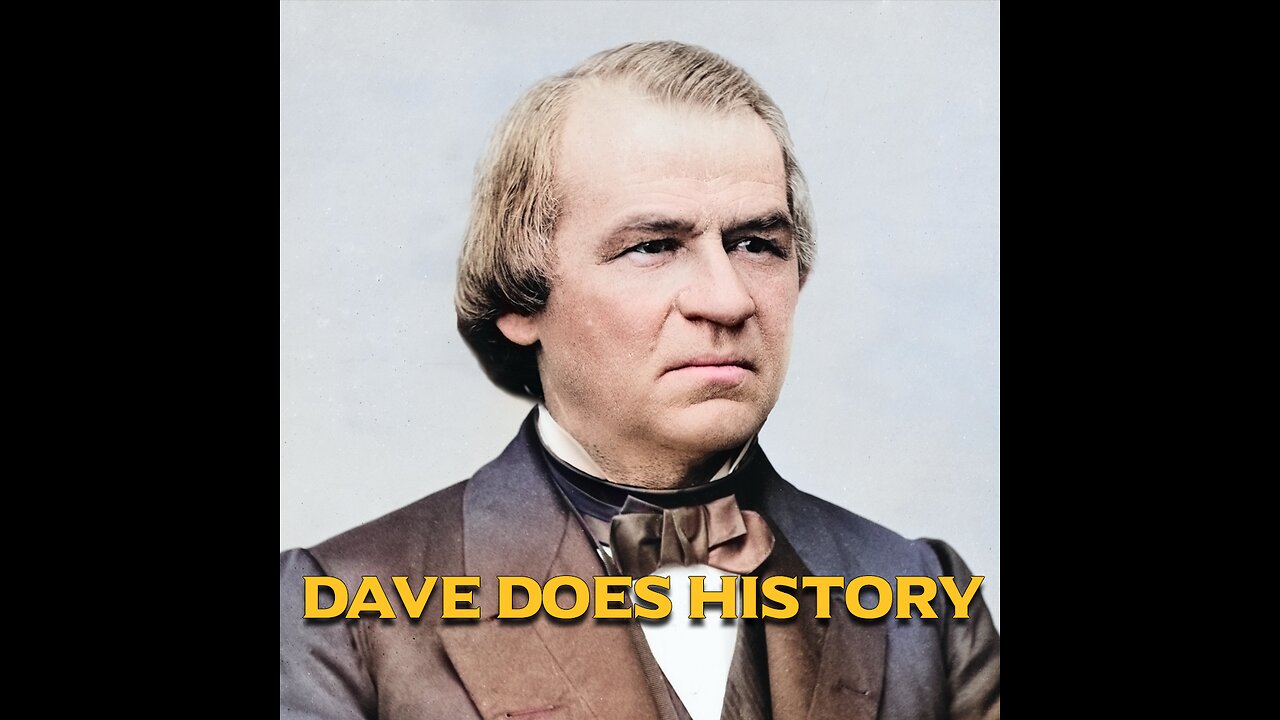Premium Only Content

DDH – “Or Aid Or Comfort To The Enemies Thereof…”
What if… we had a President who disagreed with Congress on everything? And when I say, “everything,” I mean… “everything?” What if the Congress passed a law that was so important to the national development of our society that it was deemed in many places, and a “new birth of freedom,” and the President, vetoed it? What would the reaction be? If this were to happen, how would it change the course of the nation? What would be the result of a direct conflict between the power and authority of the executive and the power of Congress to make law?
And… if this were to ever happen, what could Congress do to make sure that the President couldn’t even try to do it again?
This week on Dave Does History on Bill Mick Live, we’re going to take a look into one of the most controversial acts of the Reconstruction era: President Andrew Johnson’s veto of the 1866 Civil Rights Act.
In the aftermath of the Civil War, the United States found itself at a crossroads, grappling with the challenges of reintegrating the Southern states and defining the status of freed slaves. It was a time of bold ideas, fierce debates, and monumental legislation that aimed to redefine the fabric of American society.
The Civil Rights Act of 1866 emerged as a cornerstone, promising to grant African Americans the rights of citizenship denied to them for centuries. However, it faced opposition from an unexpected quarter: the President of the United States. Andrew Johnson, who ascended to the presidency after the assassination of Abraham Lincoln, vetoed the Act, setting the stage for a historic clash with Congress.
Why did Johnson veto this groundbreaking legislation? What were the implications of his actions, both immediate and long-term? And how did Congress respond? In this episode we will explore these questions and more, shedding light on a tumultuous period in American history that continues to resonate today.
-
 LIVE
LIVE
vivafrei
1 hour agoAnother "Trans" Mass Shooter? Rampage Jackson Keeps Digging? Democrats are Just Awful AND MORE!
1,886 watching -
 1:34:24
1:34:24
Redacted News
2 hours agoLIVE: Minnesota School Shooter’s Shocking Motive Revealed – Plus Trump Targets Soros w AG Ken Paxton
101K83 -
 DVR
DVR
StoneMountain64
5 hours agoHUNTING FOR THE FIRST WIN BACK ON WARZONE
45.5K1 -
 1:09:06
1:09:06
The Officer Tatum
2 hours agoBREAKING: Shooter IDENTIFIED TR*NS , Cracker Barrel CAVES To Pressure + MORE | EP 162
23K33 -
 53:47
53:47
Matt Kohrs
3 hours agoLIVE! Nvidia Earnings Call || NVDA Stock Reaction
18K1 -

Tudor Dixon
1 hour agoKarol Markowicz on Freedom, Immigration, and Saving the American Dream | The Tudor Dixon Podcast
51 -
 2:03:25
2:03:25
The Quartering
5 hours agoFlag Burning, Free Speech, Church Attack & More With Andrew Wilson
187K285 -

The Robert Scott Bell Show
19 hours agoDr. Peter McCullough, Vaccines: Mythology, Ideology, and Reality, Dr. Dan Sullivan, Chiropractic - The RSB Show 8-27-25
18K -
 1:21:03
1:21:03
Darkhorse Podcast
4 hours agoFreedom, Tyranny, and Childhood Lost: The 291st Evolutionary Lens w/ Bret Weinstein & Heather Heying
34.2K17 -
 LIVE
LIVE
LFA TV
11 hours agoLFA TV ALL DAY STREAM - WEDNESDAY 8/27/25
1,360 watching